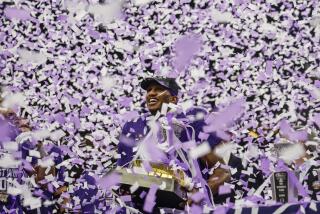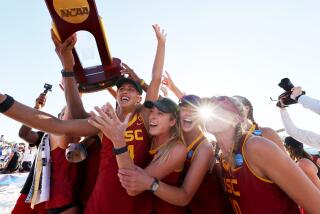Pac-12 chief Larry Scott sees bright future on national stage
Pac-12 Conference Commissioner Larry Scott’s big year begins Monday as he watches two of his teams, Oregon and Stanford, perform in lucrative Bowl Championship Series games at Pasadena and Glendale, Ariz.
In the fall, the conference’s marquee program, USC, emerges from its two-year NCAA bowl ban with a Heisman Trophy candidate quarterback in Matt Barkley and national-title aspirations certain to draw crowds and boost television ratings for the new Pac-12 network.
New coaches at UCLA, Arizona and Washington State enhance the depth.
Scott also played a role in a new partnership with the Big Ten Conference to add regular-season matchups between the usual Rose Bowl participants, and he will sit at the BCS table to discuss how to improve college football’s always controversial postseason.
What was the rationale and your role in creating the new Pac-12-Big Ten partnership?
“[It was] part of strategically thinking how to reposition the conference on a national platform beyond where it is now, thinking of ways to create better television in our new TV deals. We’ve definitively decided not to expand, so these are high-profile national matchups without expanding further. [Big Ten Commissioner] Jim Delany first mentioned it. We took the ball and ran with it. You’ll see games start in 2013, and each Pac-12 team will have a Big 10 game by 2017.”
USC-Ohio State would be a good first matchup. Do you share the Trojans’ unhappiness of the reduced discipline the Buckeyes received from the NCAA (one-year bowl ban, less lost scholarships) for what could be argued as more severe violations?
“I was certainly troubled by the severity of the punishment given to USC and expressed that. What is incumbent of the NCAA is greater transparency and fairness. I can’t say I know all the details of what happened at Ohio State, but I know the concerns USC has, and it’s still an area of concern for me. I still intend to be an advocate for equitable sanctions and the principles of NCAA transparency.”
I don’t believe there’s satisfaction that is happening.
“Right. I’m not going to comment more publicly on this. I don’t think it’s helpful. USC has a very bright future. Whatever thoughts and follow-up I need to do on this can happen internally and quietly.”
Do you aspire to a greater platform in college sports?
“I have an aggressive schedule as it is. Seven TV networks to launch by August. Important BCS discussions. Our basketball tournaments. International discussions. I just returned from Beijing, meeting with government officials, broadcasters, event promoters to stage events there; sporting exchanges with some of our teams — volleyball, basketball, swim, tennis, golf. That builds our brand and promotes our schools academically and otherwise.”
The public clearly wants change from the BCS system. How is your committee poised to act this year?
“We haven’t determined what we want yet. We’ve had discussions with colleagues. I want to preserve the value of regular-season football, and the strength of the Rose Bowl is part of the conference’s DNA. I know there are improvements that can be made with postseason football.”
But you honestly haven’t decided what the best new system should be?
“Not yet.”
What do you most anticipate about next season?
“We’ll have three top 10 teams who’ll all be well-regarded again next year, with lots of Heisman discussion. Every football game will be on national TV. It’s the biggest platform we’ve ever had, more coverage for the nation and the East Coast media. I’m an East Coast guy, so I want to give people the benefit of the doubt about East Coast bias. We’ve instead dealt with that by coming up with inventive ways to kick up our coverage.”
How important is a UCLA resurrection to you?
“Very. UCLA is one of the biggest school brands in the country, both in athletics and academics. It’s the second largest media market in the country with a very large alumni base. When they’re up, it’s helpful for the conference. I welcome Jim Mora. I won’t offer my opinions about how they improve.”
Matt Barkley’s return to USC is an exception, and it could be argued it’s only because his family has money. You have a powerful voice. What can be done to keep the truly gifted players in school for the duration?
“I’m certainly in favor of increased stipends. But two years in a row we’ve had athletes forgo the NFL’s millions to stay in school, and I think that shows you it’s not just about money, but the true value of the college experience. It proves the point there is tremendous value in staying in school.”
Oregon has the cloud of an NCAA investigation hovering over it. How confident are you that Oregon and all 12 of your football teams will avoid NCAA trouble this year?
“Because of the ongoing investigation, that’s not something I can comment on.”
lance.pugmire@latimes.com twitter.com/latimespugmire
More to Read
Go beyond the scoreboard
Get the latest on L.A.'s teams in the daily Sports Report newsletter.
You may occasionally receive promotional content from the Los Angeles Times.











